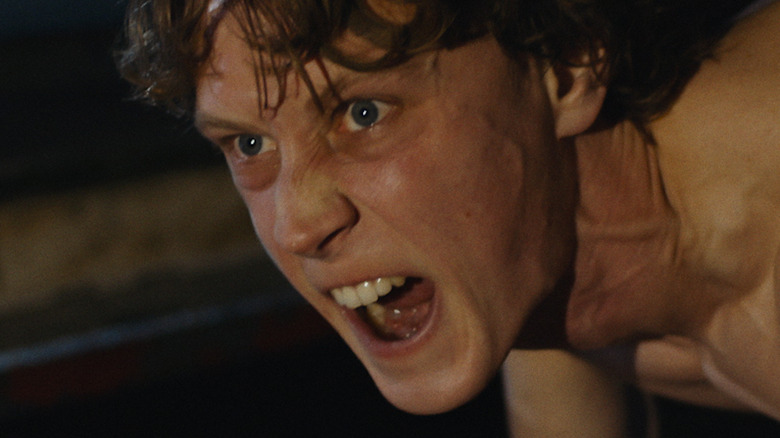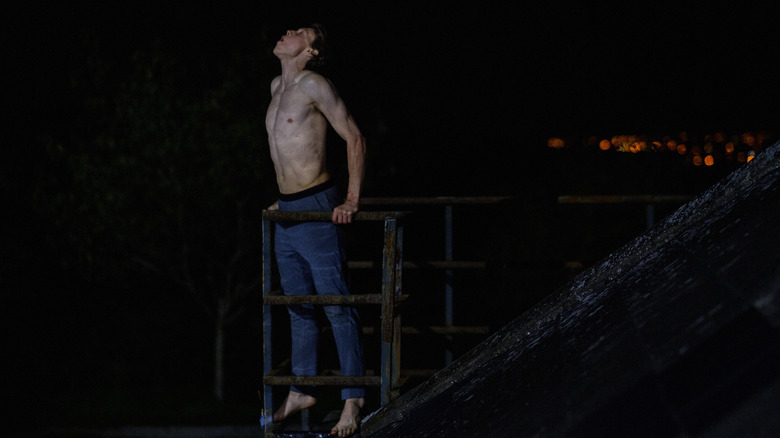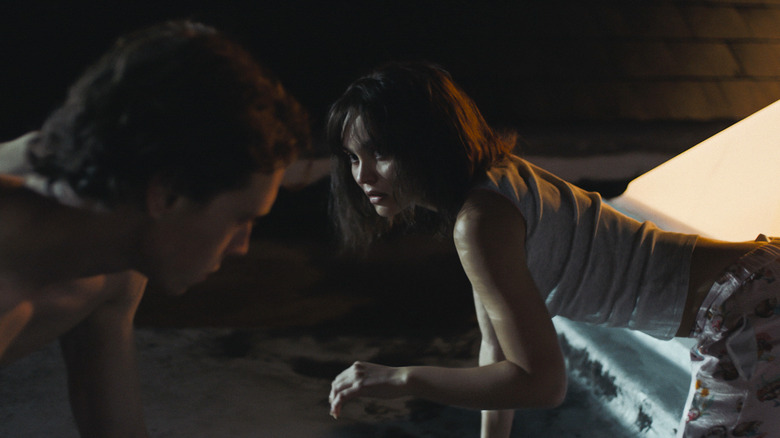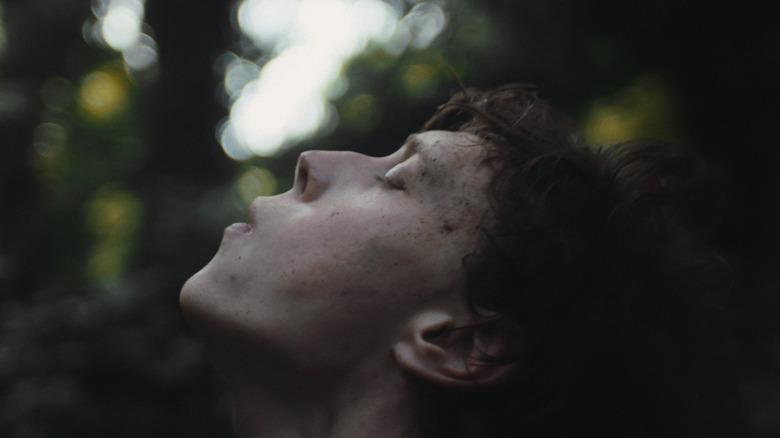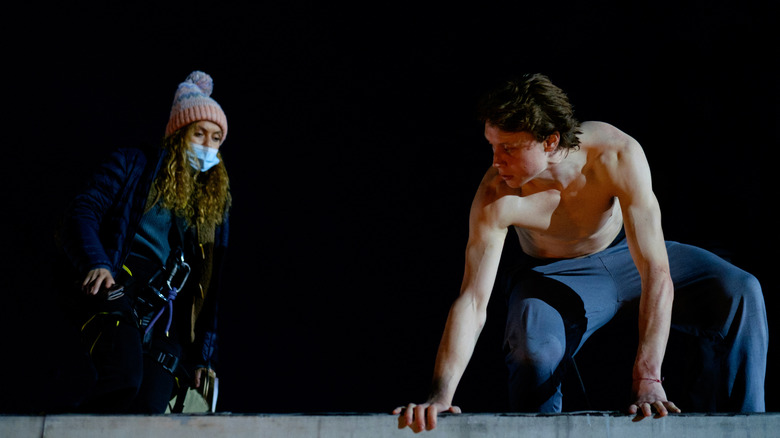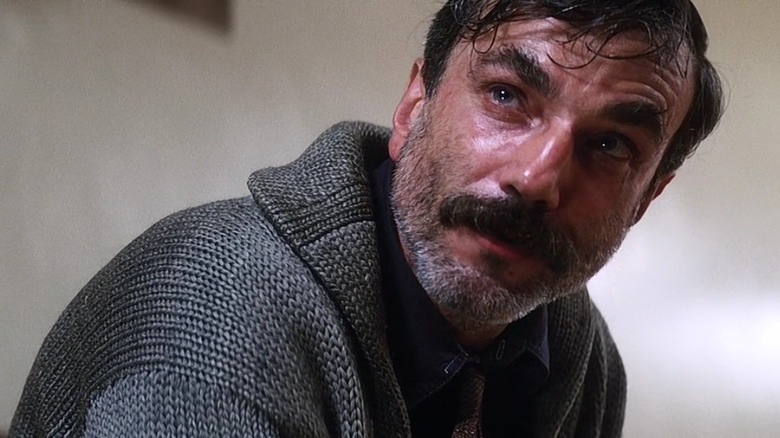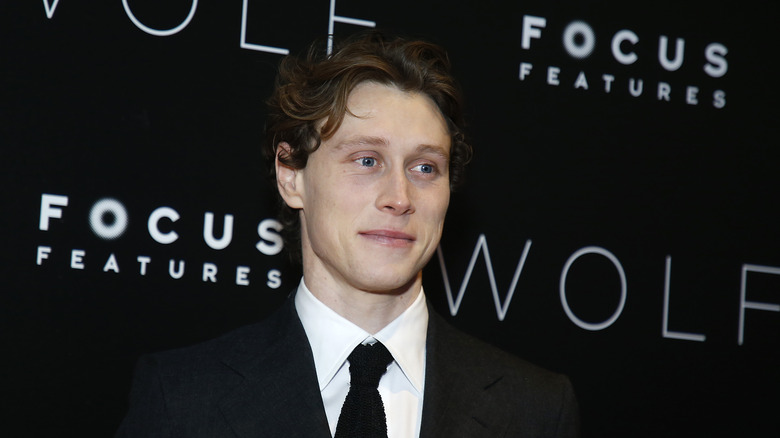Wolf Star George Mackay On Learning How To Act Like An Animal - Exclusive Interview
In "Wolf," a new psychological drama from writer/director Nathalie Biancheri ("Nocturnal"), British actor George Mackay plays Jacob, a young man technically diagnosed with a condition called species dysphoria, and someone who truly believes he's a wolf trapped in a human body. His stunned family commits him to a clinic that specializes in such cases, where Jacob begins a relationship with a young woman named Wildcat (Lily-Rose Depp) and undergoes increasingly harsh "treatments" by the clinic's cruel director, Dr. Mann (Paddy Considine), known as "Zookeeper."
Surreal and haunting, "Wolf" tackles questions of identity, acceptance and what defines a human being, with the movie centered on Mackay's intense performance as Jacob. The scenes in which he acts like a wolf are genuinely unsettling, but Mackay also invests the character with empathy and yearning. Viewers truly feel the conflict between his "human" side and his "animal" nature, and his desire to let the latter roam free.
"Wolf" was filmed during the pandemic, with the cast and crew living and working in an abandoned hotel in Ireland. The isolation from the outside world only added to the atmosphere of the film, as Mackay tells Looper. "We didn't go to a shop, didn't go to a pub, didn't go to get a coffee or anything for that nine weeks," he recalls. "It sort of lent itself to the kind of cocooned nature of the characters."
Mackay's career began in 2003 when he appeared in "Peter Pan" at the age of 10. Since then, he's compiled a number of credits both in the UK and Hollywood, including the Stephen King miniseries "11.22.63," the drama "Captain Fantastic" (as Viggo Mortensen's oldest son), and the psychological horror film "Marrowbone," opposite Anya Taylor-Joy. His biggest role to date was in Sam Mendes' "1917," where he played a soldier assigned to deliver a vital message to British troops behind enemy lines in World War I. In "Wolf," as he tells us, the battle this time is all internal.
Playing a man who thinks he's a wolf
Had you heard of species dysphoria ever before you came onto this project? And if not, were you surprised to find out that it was a real illness?
Yeah, to be honest, I hadn't heard anything about it before. And so yeah, this was my first kind of understanding of it. To be honest, in playing Jacob, I didn't really do much research in it. Because I thought for him, he doesn't feel he has it. I kind of wanted to be quite pure about this idea that he just feels that he is a wolf. I kind of went down the wolf side of things a lot more and then thought it will be his context that tells him what he's got.
So you went more on intuition and what he was feeling?
Yeah. I felt like the sort of initial kind of quandary and circumstance that Jacob is what I found so fascinating. Is he, or isn't he? And does he know that? Is it a personal choice? Basically, I made the choice that he is a wolf in a man's body. The joy of the role is trying to figure out the amalgamation of living with animal instincts. Like how does he see the world? Does he smell more? Does he hear more? Is his hearing and his smell better than his sight? You don't have a big nose and long ears. Does anyone know that? How does that make your interactions and what is it to be wild?
If you have all of those wild instincts first, but yet you have the ability to understand and learn and speak language, where does that leave you? This sort of purely animal sense was what I thought was truest for the character.
Why a wolf? Why not a fish?
Why does he choose to think he's a wolf? What is it about the wolf that makes it part of his persona?
I don't know. I guess in culture, there's all these references as to what the wolf is. What the wolf means. There are things sort of insinuated about when he had this awakening of his wolf self as a young boy and how he always felt this kind of discord in himself.
I think that's more Natalie's choice to pick that animal. I just kind of trust that's the animal he's got and if the film was called "Deer" or "Fish," I would've approached it in exactly the same way, but just with those different animals. It was again a mixture of sort of having an eye on what a wolf means in terms of our popular culture, but actually as best as I could just trying to be true to what the animal was.
All of the research on wolves is a human interpretation of one, but there was some amazing stuff about the way that wolves operate or are perceived to operate on a more scientific level that I thought was interesting for the character, and tied that to the kind of journey that he's on.
If you were an animal, what animal do you think you would be?
What I'd like to be would be a dolphin or a spider monkey because I just felt like they'd have a great time. I wish I could be cool like a wolf, but I fear I might be like a Labrador or something.
Why a spider monkey?
The physicality and the way they move through trees. They've kind of got that extra limb with their tail. Seems like a cool existence.
Getting the physicality of a wolf right
You worked with Terry Notary to prepare for this. He's well known for playing animals and other creatures through motion capture. What was that process like?
Working with Terry was amazing. Terry truly is a genius. The biggest thing that Terry began with, which was just extraordinary, is that — I had one sort of one-off session with him when I was in America at his studio and the first thing, he was like, "Just walk around the room. Let me just see how you walk." And I was walking around the room and he started kind of going, "Okay, right" ... You don't even realize you're not feeling any particular way when you go in. Then suddenly, he'd make you change the way you're holding yourself, and I could not stop giggling. Or some of the people would not be able to stop crying. He has this way of kind of connecting sort of emotions in the body in such a profound way.
So in terms of working with the wolf, one of the biggest things that we worked on, before the aesthetics of the crawling and the kind of more obvious physical work in that sense was, what is it to be wild? What is it not to be human? And a big part of that was to be without thought. So we did a lot of work on being present in the body and being present as animal, but not thinking, not constantly sort of having one eye outside of yourself, which we do in normal life. But also sometimes as an actor, you kind of learn to have one foot on the kind of technical craft, where he was just sort of purifying everything.
Was it difficult to get the howl right? Did you go through a lot of different versions of it?
Yeah. Thanks for mentioning it. It was a mixture of going, "All right well, he's a wolf. He's howling. What is a howl to a wolf?" So I went through some more scientific research and looking at wolves and books and studies on wolves, which again is a human interpretation as to why howls are used and what we think that they're saying. Then I kind of cherry picked the things which felt most relevant to our story and to Jacob's character. Then I went, "Okay, well, his quandary is that he's in a human body, so let's find a purely human sound for that, be it a call to your kid or something." Jacob's interpretation of that would be a call to someone in his state as well ... Then I went back to listen to a ton of different wolf howls to kind of encapsulate the whole thing.
Shooting the movie in quarantine
According to the production notes, this was the first independent production in Ireland to start shooting during the pandemic. Was it strange to begin shooting a movie when the world had changed so much? Did living in a quarantine bubble reflect the setting of the movie itself in a way?
Yeah, it did. We'd done our first week of rehearsals at that point when things shut down. So it actually gave us kind of — we planted a bunch of seeds in terms of the character and creatively that we could then go away and work on. Actually the character and I think the whole film really benefited from having that extra prep time. I think definitely (it did from) the intensity of living in a hotel for the entire nine weeks of the shoot. We didn't go to a shop, didn't go to a pub, didn't go to get a coffee or anything for that nine weeks. It sort of lent itself to the kind of cocooned nature of the characters.
But that said, the other thing is that I like to get quite, I don't know, is monastic the word? The word when if you sort of strip everything back when you're working. You just have that sole focus. I think it's always, to be honest, it makes the job easier. You don't have to be sort of filtering all the day-to-day. And that was sort of intensified all the more by the fact we were living as we were. I think that lends itself to the production because it's such a particular production as well.
George Mackay on other actors and filmmakers
Name one actor or director you've never worked with that you'd love to work with, past or present, living or dead.
Paul Thomas Anderson as a director. And as an actor, maybe I guess they kind of go together, Joaquin Phoenix ... I remember I was auditioning for a role once and the director referenced Paul Thomas Anderson performances, and he said, there's always one character particularly who's giving a massive performance. It's always massive, but it's bang on. I think that sort of theatricality is something that I find really inspiring in terms of performances, whether it's Joaquin Phoenix in "The Master" or Daniel Day-Lewis in "There Will Be Blood."
When someone's doing something quite big and quite theatrical, but it is absolutely truthful and somehow just right, I think that's amazing. And to work with the director that could help bring that out of you and encourage that would be amazing. I always just think his films... I haven't seen all of his films, but from the films I have seen, they just look so beautiful. It's proper cinema.
Do you have a favorite film of all time?
I think my go-to is "Gladiator" for a number of reasons. I think again, it's so cinematic and personally, it was the first DVD that my family had as well. I remember when that transition to DVD happened and we were a bit behind a few other families in getting a DVD player. And then we got it, this double disc, and watching the "making of," I was blown away by how they made it. I was as fascinated with that as I was all the battle sequences, particularly. And the music as well. The music is just stunning as well.
Is there a role that you wish you could play, past or present?
Not really. Because I think all the roles that I admire greatly, they've all been done by someone, and they've been done in a way that only that person could do them ... And also all the things which I've had the best time on, I could never have dreamt them up before that. So, no. I'm afraid I don't really have an answer for that one.
Mackay has three other projects he's excited about coming up
What else besides "Wolf" is coming up for you that you're particularly excited about?
The next film to come out is in January, called "Munich: The Edge of War." It's really cool. It's a thriller set the year before the Second World War. It's about the peace treaty that was being brokered by Neville Chamberlain with Hitler and the powers-that-be across Europe to stop essentially war breaking out. It's with a directer called Christian Schwochow, and it's got this really.... It's difficult to talk about objectively when you're in it, but I just think there's a really particular energy about the script and about the story.
Then there's two other projects. I've just finished filming a Babak Anvari film ["I Came By"]. I don't know if you saw "Under the Shadow." He's got a really cool thriller set in London about these two graffiti artists who get caught up in something that they wish that they didn't. I can't tell you too much more. But working with Babak was really exciting and the script is amazing. And then I'm currently working on a Shane Meadows TV series called "The Gallows Pole." I've been a massive fan of Shane's work for ages, so to work with him is a real special thing.
"Wolf" is out in theaters now.
